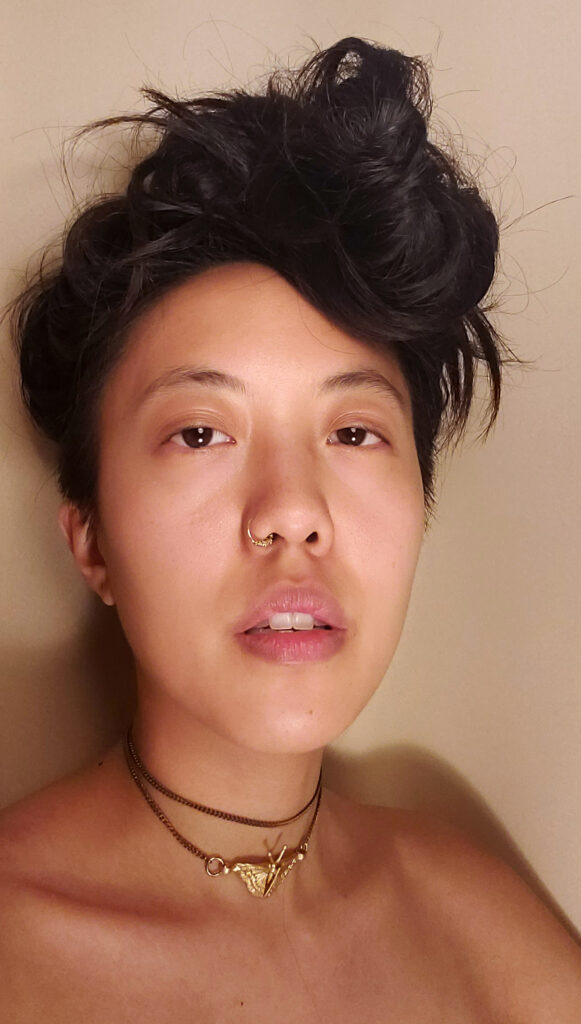A version of this post was originally published on Seven Yrs Later.
By Guest Contributor: Nicole Rapatan
I nudge my laptop and stretch my legs along the backseat. Working from home has lost its charm and extra effort needs space, so journals litter 4 sq. ft. floor mats and hide a college application essay from 11 years ago. I refresh for updates and realize that another person was shot, that he survived what eight people at two spas did not. I graze posts by women who look like me and ingest each one that I can. There is anger articulate and dismay indefinite while I flip through my papers blankly. I’m looking for the throughline of something wrong, how I’m at a loss to feel something so obvious. I’ve been American for as long as I could remember. It’s taken weeks to see who I am before that.
Mom and Dad came through JFK, closer to Ellis Island than Angel. I’m a city slicker by birth, cowkid by youth, Pinoy by milk and blood. Lola tended to her first grandchild as Mom and Dad worked when and where they had to. Memories overwritten, I imagine sewing machine laughs and strong whiffs of my forehead until Lola was pulled back to her homeland. A scattered village took place and I slept over at every Tita’s I wasn’t related to. Decor and playmates changed, but the lumpia still crunched, loganisa sizzled, fish bubbled, and rice plopped. I traded them for Lunchables at school as I liked the Reese’s and ham, water added.
Lesser tastes rhymed and stretched eyes to deem me Chinese, but I’d retort I was Filipino, even if the best movie was Mulan. When I started Spanish in first grade, the grown-ups proclaimed its shared base with Tagalog, the Philippines’ national language, yet that was an ocean away from Arizona; I wasn’t Mexican though we were the same crayons. I browned with glee on family visits and classmates would notice, often with envy as Dad confirmed. Donning my “Filipina with a Brain” shirt, I still heard “Chinese,” less insult than mislabel, but it didn’t stop me from tackling assholes. Otherwise, I was reputably high-achieving and polite, which are supposedly Asian qualities, but I’m my parents’ daughter. I remained so after the divorce, new schools and addresses, but some things had to give way.
What’s become apparent the past decade is that much of what exists warrants a reckoning, and America is not exempt, and neither am I. In the same decade, I’ve joined collectives that celebrate nuanced identities; found creatives and friends who share mine; written stories about what I’ve inherited, what I enfold and what I want challenged. I engage with my fractious self because I’d rather feel deserving than defined.
I cobbled together friends who would accept someone so quiet and found white and black kids who liked anime and the five other Asians in my grade. Our class got into the paper for being “diverse” though we had less than 25 kids; I guess it was interesting we resembled a model UN. While I was annoyed that we didn’t have more bread at home, I don’t recall wanting to be white. The white people around me didn’t make a big deal out of being white, so I didn’t make a big deal out of being Asian. Then college apps came, student body stats, then letters, and something I stopped paying attention to moved with me to California.
No one asks where I’m from like Asian people do: I say, “Arizona,” and they say, “No, really.” Other ethnicities ask too, but they don’t have the rubric, the one that deducts when I forget to take my shoes off and when I cannot eat pho. I left a feast hungry when I couldn’t apply chopsticks like my Chinese friends did, and worse, how my white friend did. Korean and Taiwanese kids took me to night markets, shopping trips, their houses, a grunion run, but I waited for the moment when my card would be revoked. I didn’t know that India was part of Asia, that eyelids were a thing, that people cared that much about the moon. Yet when someone non-Asian assumed I knew, I bristled on presumably one’s behalf.
Confounding this, no one can tell what I am, not even other Filipinos. I’ve heard Thai, Mongolian, Japanese, Mexican, but in the Philippines, I’m almost exclusively guessed as Korean. Having met actual Koreans, I see no resemblance, but it’s fine to be mistaken for an heir to a beauty empire. My light tan and lanky frame perhaps take cue from Hispanic and Chinese bends in my line. At least my nose is classically nonexistent; Dad said our ancestors fell flat on their faces.
Influenced and occupied by East Asia, Spain and the US, the traditions of 2000 inhabited islands melt thick. Competitive excellence and adherence to elders seem to run familiar throughout Asia, though that racialized formula gets reinforced everywhere. While malls decline in the states, they’ve surged in the Philippines, blasting Taylor Swift and airing NBA games to cheering food courts. My enormous family is less like Eat Drink Man Woman and more like My Big Fat Greek Wedding if Greeks were staunchly Catholic. Mom is one of seven, and her mom, one of eleven, and that adds up to joyous Sunday shouts over the clinks of forks and spoons. And I, a former nonconformist, one of one, who goes to church when I feel guiltiest, would find this mix profound if I just knew what anyone was saying.
My parents thought Tagalog would confuse me; people speak English here after all. I had a few ad hoc lessons—“Kamusta ka” and “I know that already”—but I understood enough what was meant, unaware that Mom had a different dialect than Dad. Yet after the divorce, the sole common language became English, sprinkled with “anak” and “pangga.” International cousins translate for me and Filipino strangers scoff soon after they hear that I’m not Korean.
I practiced Spanish for years, passed an AP test, wrote a 20-page paper, yet I never tested my tongue in LA. Cuban and Nicaraguan friends flowed, and I understood them more than I did Tagalog, but I did not trust that I could jump in. Even if I remember the words, there’s the way to say them; I went on a date with a Filipino who said lolo with long o’s and I knew that it was over. A great-aunt pressed the importance of knowing multiple languages and I was well-aware. I had begun to understand what not understanding has kept me from by then.
I think of how I’m entering thorny territory, how this isn’t a proclamation of pride or thorough takedown of someone else. What’s become apparent the past decade is that much of what exists warrants a reckoning, and America is not exempt, and neither am I. In the same decade, I’ve joined collectives that celebrate nuanced identities; found creatives and friends who share mine; written stories about what I’ve inherited, what I enfold and what I want challenged. I engage with my fractious self because I’d rather feel deserving than defined.
One’s background and value cannot be determined by sight and I’m not obligated to answer anyone’s thoughts on mine. But then I consider the Asian Americans who’ve been forced to answer to others’ perceptions without a single word.
I haven’t reached full acceptance that where I lack has its own authenticity. What eggs that on is the one-take that I should be an encyclopedia on being Asian, let alone a symbol for Filipino America. One’s background and value cannot be determined by sight and I’m not obligated to answer anyone’s thoughts on mine. But then I consider the Asian Americans who’ve been forced to answer to others’ perceptions without a single word.
Before “Kung flu,” Vicha Ratanapakdee, 84, took a walk when he was rammed into the ground and died of a brain hemorrhage. Pak Ho, 75, suffered a fatal injury from someone who assaulted another 70-year-old Asian man weeks before. Before a Filipino woman, 65, was stomped in Manhattan, an unnamed 39-year-old was doused with acid in Brooklyn. Daoyou Feng, Hyun Jung Grant, Sun Cha Kim, Soon Chung Park, Xiaoje Tan, and Yong Ae Yue, 44 to 74, six Asian women of nine victims, were shot while doing their jobs. In 1989 Stockton, a gunman entered a school, wounded 30, and killed five children of Cambodian and Vietnamese refugees. In 1982 Detroit, Vincent Chin, 27, was butchered as a war cry against the Japanese auto industry, despite Vincent being Chinese. Chinese people were purposely targeted in 1871 Los Angeles during one of the largest mass lynchings in US history. The past year’s headlines do not cover every spittle and slur, majority directed towards women and the elderly.
Appearances don’t matter unless you’re seen as threatening and violence doesn’t ensue unless you seem defenseless. I want to claim my identity before someone claims it for me. I’ll take your questions now.

Nicole Rapatan is a Filipino American writer based in Burbank, CA. Before crafting essays and screenplays, she won the county spelling bee twice. Hit her and her diary up at www.nrapatan.com.
Learn more about Reappropriate’s guest writing program and submit your work here.

